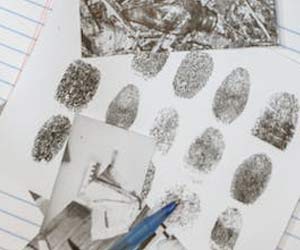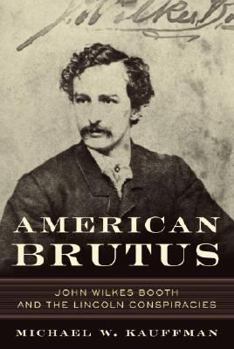American Brutus: John Wilkes Booth and the Lincoln Conspiracies
Select Format
Select Condition 
Book Overview
It is a tale as familiar as our history primers: A deranged actor, John Wilkes Booth, killed Abraham Lincoln in Ford's Theatre, escaped on foot, and eluded capture for twelve days until he met his... This description may be from another edition of this product.
Format:Hardcover
Language:English
ISBN:037550785X
ISBN13:9780375507854
Release Date:November 2004
Publisher:Random House (NY)
Length:508 Pages
Weight:1.92 lbs.
Dimensions:1.7" x 6.6" x 9.4"
Customer Reviews
5 ratings
Sic Semper
Published by Thriftbooks.com User , 18 years ago
Hundreds imprisoned in American jails with no expectation of probable cause, including a third of the Maryland state legislature. Prisoners shrouded in hoods. Citizens having to sign "loyalty statements" before they vote. Some kind of scenario dreamt up for a modern movie mimicking the current US regime? Nope. It's a description of the wartime policies of the first Republican administration, Abraham Lincoln's. And according to Michael W. Kauffman's brilliantly lain out narrative of Lincoln's assasination and its aftermath, the tension these policies led to in Maryland, especially, was quite palpable. Since Maryland was a border state....Union, but Southern by culture and values (some in Maryland had slaves), many had mixed feelings about the war and about any support for the Union cause. Enter John Booth, son of famous stage actor Junius Brutus Booth, and soon to become an even greater star. John Booth seethed with anger throughout the war, even as he built his acting career, until he began to hatch the plot that took place at Ford's theater on the night of April 14, 1865. Part of what motivated him, however, was the praise and cheers he thought he'd get from over the country after his deed was done. And much of his story plays out as a twisted version of Shakespeare's "Julius Ceasar" (one in which John and his brothers had often starred), where the assasin Brutus, instead of being honored as in the play, is hunted down, injured, and finally killed as he hides in a burning barn. Though we may know the "facts" of the story from junior high school history (Ford's theater, "Our American Cousin", "Sic semper tyranis!",), here is a book that not only fleshes out that terrible night, but takes us into the investigation much like Truman Capote's "In Cold Blood" did for the Cutter murders of the 1950s. Plunging into Booth's history through the use of eyewitness accounts, letters, archives, and a good knack for putting two and two together, Kauffman shows how some earlier accounts missed or inadvertantly added things to the story (a good example is the alleged guilt of Dr. Mudd, the doctor who treated Booth's broken leg after the fall from the President's box to the stage). This is great historical reading. It reads easily, brings out information not yet considered, and provides good analysis of that information, both from a psychological and historical viewpoint. I thoroughly enjoyed it and would very much recommend it.
Excellent
Published by Thriftbooks.com User , 18 years ago
I certainly am not a Lincoln-Booth scholar, but I must admit that I am fascinated by this account. I cannot help but feel that Booth, being the master manipulator that he was, had planned assassination and NOT kidnapping from the beginning. As he is described here he is obsessed with the treatment he felt the South was getting, and I can't believe he planned only to kidnap Mr. Lincoln in return for southern prisoners. He managed to persuade others around him of his intention to kidnap only to obtain their help, and also to bring them into suspicion in the event of his capture, which he did. The trial and resultant punishment of the guilty parties only reminds me of the reaction we experienced following 9/11 which resulted in the Patriot Act. (So times have probably not changed that much). To bring to trial and to punish the guilty, giving them the death penalty to be carried out within two days of the decision, and all the other details within a month or two seems to be unbelievable and obviously was the result of panic and the seeking of some sort of revenge. Mr. Kaufmann raised many questions still unanswered, but he gave us a fascinating reading by any means.
Tour de force
Published by Thriftbooks.com User , 20 years ago
Michael W. Kauffman has made a major contribution with "American Brutus," a page-turner borne of 30 years of research. The main current of this detailed volume reveals Booth as cunning, manipulative, and far more adroit than many have imagined in luring associates to do his bidding, or in implicating others in his schemes. "American Brutus" is significant also for its many previously unpublished photos and documents. Moreover, the voluminous endnotes are intriguing and invite careful and fascinating reading, time and again. Throughout this important book, Kauffman's interpretations suggest unhurried analyses, offering many occasions to pause and reflect. Even when his assertions deviate from accepted versions of events, the reasoning is compelling. For example, a widely held belief is that Booth broke his leg in jumping from Lincoln's box, a view Booth himself encouraged in his self-aggrandizing diary entry. But this is difficult to square with contemporary accounts by startled eyewitnesses (e.g., "We Saw Lincoln Shot," by Timothy S. Good) who described the assassin as dashing athletically across the stage. Orthopedists and physiologists can argue what feats are possible during an adrenaline rush, but one wonders how a man can sprint the stage then mount a horse with his broken left leg without any signs of impairment. Kauffman offers an alternative and entirely believable version of when Booth actually broke his leg. Mr. Kauffman reinforces the position of Edward Steers ("Blood On The Moon") that the conspirators' fate should be viewed in light of 19th century -- not present -- law. While Mrs. Surratt might not be executed today, nor perhaps would Spangler, O'Laughlen, or Arnold et al receive such lengthy sentences, their judgments followed precedent for that period. Like a previous reviewer, I was fortunate enough to meet Mr. Kauffman in September 2001 (just before the attacks) durng the Booth Escape Route Tour. Throughout the tour and over lunch, it became evident Mr. Kauffman is a font of knowledge concerning the Lincoln tragedy and aftermath, and I wondered why he had not contributed a significant work. "American Brutus" answers this question in spectacular fashion indeed. Hail Kauffman -- and seize "American Brutus."
Excellent
Published by Thriftbooks.com User , 20 years ago
A couple of years ago I had the pleasure of attending the John Wilkes Booth Escape Route tour sponsored by the Surratt Society (...). Mr. Kauffman was the tour guide and I enjoyed the tour greatly. So I looked forward to this book. Mr. Kauffman has done what other historians have not: he went back to the eye-witness accounts taken on that night and the following days. In other words, he used information that has not been polluted by the exaggeration and imagination of the human memory. For example, immediate eye-witness accounts at Ford's Theater dispell the oft-quoted "fact" that that Booth broke his leg when he jumped from the balcony to the stage. But this book does not address Booth's escape only. Mr. Kauffman includes additional information about the times. The contemporary reader will be interested in the parallels between 1860-1865 USA and the current status of the USA: a politically polarized nation, criminal profiling (a US Congressman was detained at a train station because he looked somewhat like Booth), sketchy homeland security (the bridges out of DC were like sieves allowing Booth and Herold to escape), a massive military search for the assassins, joyous celebrations in foreign countries and anti-American sentiment following an American tragedy, etc. Mr. Kauffman's Booth is a consummate villian who carefully and thoughtfully plotted the Lincoln Assassination and who skillfully manipulated numerous people, thus entangling them into his web. His book gives the reader a good idea of the times and shows us that after 130 years, nothing much has really changed. Wonderful book. Well researched. Well presented.
The Death of Lincoln Revisited
Published by Thriftbooks.com User , 20 years ago
This is a wonderful gripping page-turning biography with an assassination of a President at its core. Mr. Kauffman has written history in the style of a novel without sacrificing accuracy or stretching the boundaries of probabilities. This is the best single description that I have ever read of the night that Lincoln was murdered, at the moment of his greatest glory with the Civil War winding down with the surrender of General Lee earlier in the week. Most of the previous assassination/conspiracies accounts have centered upon Lincoln, with John Wilkes Booth as the mysterious off-stage actor. Mr. Kauffman has written for this generation the definitive story of how Lincoln came to die, with this prominent actor pulling the various strings to accomplish his goal. "American Brutus" has all the usual suspects (Mary Surrat, Dr. Mudd, David Herold, et al) being manipulated in the elaborate web that Wilkes has weaved for the Confederate cause. One comes away with a sense of what it was like to live in the Washington D.C. region during the Civil War. Current residents (and future visitors) of that region will especially enjoy this book (with its maps) and be able to re-trace Wilkes' escape route, tour Ford's Theater and see the locations where the plotting occurred. Mr Kauffman had performed exhaustive research without cramming all of it down the throat of the reader. This is a book that a non-reader of history will enjoy and a likely nominee for next year's Pulitzer's Prize for history.
American Brutus: John Wilkes Booth and the Lincoln Conspiracies Mentions in Our Blog

11 True Crime Books Offering a Unique Historical Perspective
Published by Ashly Moore Sheldon • October 11, 2022
We love books that educate while also entertaining us. Historical true crime offers a gripping story enriched with a bit of a history lesson. Read on for eleven true crime books shining a light on a particular moment in history.





